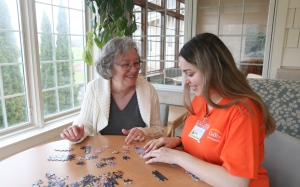Navigating Loss: Understanding Bereavement Care in Hospice
Hospice bereavement care is a specialized support system offered to individuals and families who are living with the loss of a loved one. Beyond just offering a listening ear, hospice bereavement provides ongoing comfort, guidance, resources and education to help individuals navigate grief and loss.
Many people think that grief and bereavement are the same thing, but they really have different meanings.
- Grief is a normal reaction to a loss.
- Bereavement: the period of sadness and mourning that follows a death. It’s important to realize that grief isn’t linear, and everyone experiences it differently.
Grief doesn’t start when a loved-one dies. Oftentimes Both the patient and family experience emotional responses throughout the health care journey called anticipatory grief. Anticipatory grief may involve feelings of sadness, guilt, anger, and fear before an anticipated or impending death.
According to Medicare, hospice providers are required to offer bereavement counseling which means emotional, psychological, and spiritual support before and after the death of the patient. These requirements are broad which means the breadth and quality of hospice bereavement programming varies greatly.
Bereavement programs offer a lifeline during one of life’s most challenging times. A comprehensive program offers a variety of in-person, virtual, and phone support to meet all ages wherever they are in their grief journey. A trained bereavement professional can assess how you are coping with grief and offer education and support. Most people feel strengthened, encouraged and supported when they learn about grief, understand how it affects them, identify coping strategies, and learn new methods to help themselves through the grief experience. Robust bereavement programs honor the unique ways people grief and should include support both before and after a death including:
- One-on-One Counseling: Private sessions with trained and licensed staff
- Support Groups: Professionally led groups that connect people with others who understand what they're going through
- Educational Materials: Resources that explain the grieving process and provide practical coping strategies
- Supportive Communication: Gentle check-in calls and mailings that remind families they haven't been forgotten.
- Memorial Programs
- Holiday Programming
- Grief support that extends into the community such as schools, community organizations and nursing facilities
At its heart, bereavement care is about honoring the whole family's experience. It validates pain of loss while providing the tools needed to navigate a path toward healing and remembrance.
Use this bereavement program checklist when choosing a hospice and palliative care provider to ensure you receive the quality of grief support you deserve.
At Unity, we truly believe no one in our communities should grieve alone.





